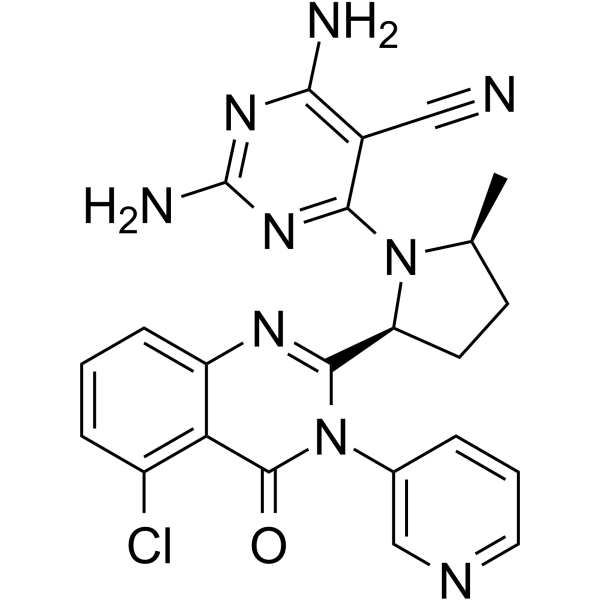PI3Kδ/γ-IN-3
Modify Date: 2024-01-10 12:09:05

PI3Kδ/γ-IN-3 structure
|
Common Name | PI3Kδ/γ-IN-3 | ||
|---|---|---|---|---|
| CAS Number | 2730151-31-0 | Molecular Weight | 473.92 | |
| Density | N/A | Boiling Point | N/A | |
| Molecular Formula | C23H20ClN9O | Melting Point | N/A | |
| MSDS | N/A | Flash Point | N/A | |
Use of PI3Kδ/γ-IN-3PI3Kδ/γ-IN-3 (Compound 58) is a potent and orally active PI3Kδ and PI3Kγ dual inhibitor with IC50s of 1 nM and 16 nM, respectively. PI3Kδ/γ-IN-3 induces tumor cell apoptosis and can be used for B-cell malignancies research[1]. |
| Name | PI3Kδ/γ-IN-3 |
|---|
| Description | PI3Kδ/γ-IN-3 (Compound 58) is a potent and orally active PI3Kδ and PI3Kγ dual inhibitor with IC50s of 1 nM and 16 nM, respectively. PI3Kδ/γ-IN-3 induces tumor cell apoptosis and can be used for B-cell malignancies research[1]. |
|---|---|
| Related Catalog | |
| Target |
PI3Kδ:1 nM (IC50) PI3Kγ:16 nM (IC50) |
| In Vitro | PI3Kδ/γ-IN-3 (Compound 58) (72 h) shows antiproliferative activity against B-cell lymphoma (DLBCL) cells[1]. PI3Kδ/γ-IN-3 (0.5 μM, 24 h) arrests cell cycle at G0/G1 phase in SUDHL-6 and DOHH2 cells[1]. PI3Kδ/γ-IN-3 (1.5 and 2 μM, 48 h) induces cell apoptosis in SUDHL-6 and DOHH2 cells[1]. Cell Proliferation Assay[1] Cell Line: SUDHL-4, SUDHL-6 and DOHH2 cells Concentration: Incubation Time: 72 h Result: Showed antiproliferative activity with IC50s of 0.03 ± 0.03, 0.06 ± 0.01 and 0.20 ± 0.04 μM against SUDHL-4, SUDHL-6 and DOHH2 cells, respectively. Cell Cycle Analysis[1] Cell Line: SUDHL-6 and DOHH2 cells Concentration: 0.5 μM Incubation Time: Alone or in combination with Ibrutininb (HY-10997) (0.5 μM or 1 μM) for 24 h Result: Caused a loss of G2/M phase cells and an increase in the percentage of cells in the G0/G1 phase. Induced cell cycle arrest alone or in combination with Ibrutinib in both cells. Apoptosis Analysis[1] Cell Line: SUDHL-6 and DOHH2 cells Concentration: 1.5 μM and 2 μM Incubation Time: Alone or in combination with Ibrutininb (1.5 μM or 1 μM) for 48 h Result: Demonstrated the induction of apoptosis in both SUDHL-6 and DOHH2 cells, and the combination was stronger than treated alone. |
| In Vivo | PI3Kδ/γ-IN-3 (Compound 58) (5 and 10 mg/kg; p.o.; daily for 14d) suppresses the tumor volume in a dose-dependent manner without obvious toxicity in mice[1]. Animal Model: Female non obese diabetes/severe combined immunodeficient (NOD/SCID) mice, 6- to 8-week-old, SUDHL-6 xenograft model[1] Dosage: 5 and 10 mg/kg alone or in combination with 10 mg/kg Ibrutinib Administration: Oral administration, daily for 14 days Result: Suppressed the tumor volume in a dose-dependent manner and demonstrated superior efficacy relative to Ibrutinib at 10 mg/kg QD administration. When in combination with Ibrutinib, showed greater tumor growth inhibitory effects. Animal Model: SD rats[1] Dosage: 5 mg/kg Administration: Oral or intravenous administration (Pharmacokinetic Analysis) Result: PK Profiles of PI3Kδ/γ-IN-3 (Compound 58) in Male SD Rats[1] Compound dose (mg/kg) administration route Cmax (ng/mL) Tmax (h) AUC0-t (h•μg/L) T1/2 (h) CL (L/h/kg) Vss(L/kg) F (%) 58 5 oral 3637.81 3.33 8612.57 9.46 0.79 -- 126.5 5 intravenous 860.09 0.08 6806.92 2.79 0.75 2.86 -- PK profiles: Cmax, maximum plasma concentration; Tmax, tim |
| References |
| Molecular Formula | C23H20ClN9O |
|---|---|
| Molecular Weight | 473.92 |